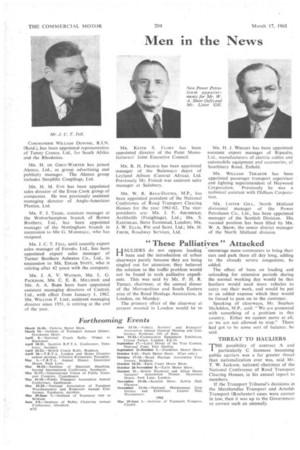"These Palliat ives " Attacked
Page 50

If you've noticed an error in this article please click here to report it so we can fix it.
LIAULIERS do not oppose loading bans and the introduction of urban clearways purely because they are being singled out for attention; they believed the solution to the traffic problem would not be found in such palliative expedients. This was said by Mr. P. H. R. Turner, chairman, at the annual dinner of the Metropolitan and South Eastern area of the Road Haulage Association, in London, on Monday.
The primary effect of the clearway at present mooted in London would be to
encourage more commuters to bring their• cars and park them all day long, adding to the already severe congestion, he added.
The effect of bans on loading and unloading for extensive periods during the normal working day would be that hauliers would need more vehicles to carry out their work, and would be put to an added expense which they would be forced to pass on to the customer.
Speaking of clearways, Mr. Stephen MeAdden, M.P., said: "We are presented with something of a problem in this country. Either we cannot move at all, or we are not allowed to stop." There had got to he some sort of balance, he said.
THREAT TO HAULIERS
THE possibility of contract A and
particularly C licensees becoming public carriers was a far greater threat than nationalization ever was, said Mr. T. W. Jackson, national chairman of the National Conference of Road Transport Clearing Houses, in his annual report to
members.
If the Transport Tribunal's decisions in the Merchandise Transport and Arnolds Transport (Rochester) cases were correct in law, then it was up to the Government to correct such an anomaly.




































































































































